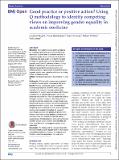Good practice or positive action? Using Q methodology to identify competing views on improving gender equality in academic medicine
Abstract
OBJECTIVES: The number of women entering medicine has increased significantly, yet women are still under-represented at senior levels in academic medicine. To support the gender equality action plan at one School of Medicine, this study sought to (1) identify the range of viewpoints held by staff on how to address gender inequality and (2) identify attitudinal barriers to change. DESIGN: Q methodology. 50 potential interventions representing good practice or positive action, and addressing cultural, organisational and individual barriers to gender equality, were ranked by participants according to their perception of priority. SETTING: The School of Medicine at the University of Leeds, UK. PARTICIPANTS: Fifty-five staff members were purposively sampled to represent gender and academic pay grade. RESULTS: Principal components analysis identified six competing viewpoints on how to address gender inequality. Four viewpoints favoured positive action interventions: (1) support careers of women with childcare commitments, (2) support progression of women into leadership roles rather than focus on women with children, (3) support careers of all women rather than just those aiming for leadership, and (4) drive change via high-level financial and strategic initiatives. Two viewpoints favoured good practice with no specific focus on women by (5) recognising merit irrespective of gender and (6) improving existing career development practice. No viewpoint was strongly associated with gender, pay grade or role; however, latent class analysis identified that female staff were more likely than male to prioritise the setting of equality targets. Attitudinal barriers to the setting of targets and other positive action initiatives were identified, and it was clear that not all staff supported positive action approaches. CONCLUSIONS: The findings and the approach have utility for those involved in gender equality work in other medical and academic institutions. However, the impact of such initiatives needs to be evaluated in the longer term.
Citation
Bryant , L D , Burkinshaw , P , House , A O , West , R M & Ward , V 2017 , ' Good practice or positive action? Using Q methodology to identify competing views on improving gender equality in academic medicine ' , BMJ Open , vol. 7 , no. 8 , e015973 . https://doi.org/10.1136/bmjopen-2017-015973
Publication
BMJ Open
Status
Peer reviewed
ISSN
2044-6055Type
Journal article
Description
© Article author(s) (or their employer(s) unless otherwise stated in the text of the article) 2017. All rights reserved. No commercial use is permitted unless otherwise expressly granted.Collections
Items in the St Andrews Research Repository are protected by copyright, with all rights reserved, unless otherwise indicated.

